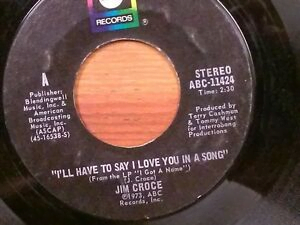January 7, 2022 —– Chart #125
Hello Music Friends,
Welcome to 2022! Looks like we have another wave of covid to start the new year, hopefully the last! No matter, my weekly music emails continue undeterred. You may notice that the name has changed slightly, this is now “Chart of the Week”. I should have changed the name long ago as these emails come to you every Friday. If you want to add anyone to the distribution list just send me a note.
On New year’s Eve I was with a good friend playing music and was asked for the umpteenth time, “Have any Jim Croce?”. My answer was once again “no”, a response for which I have no plausible excuse. So today we will fix that error and you will get a wonderful song by Mr. Jim Croce.
“I’ll Have to Say I Love You in a Song” is the title of a posthumously released single by the American singer-songwriter Jim Croce. The song was written by Croce and was originally released on his album I Got a Name. It entered the Billboard Hot 100 chart at position No. 73 in March 1974. It peaked at No. 9 in April 1974, becoming his fifth and final Top 10 hit. In addition, the song went to No. 1 on the Billboard adult contemporary chart and reached No. 68 on the Billboard country music chart, Croce’s only song to chart there. This song is noted for the use of backup singers, as well as a string section, that plays a counterpoint melody during the concluding instrumental.

Croce was killed in a small-plane crash in September 1973, the same week that a 45RPM single, the title cut from his studio album I Got a Name was released. After the delayed release of a song from his previous album (“Time in a Bottle”) in late 1973, “I’ll Have to Say I Love You in a Song” was chosen as the second single released from his final studio album.
Croce wrote the song in early 1973 when he arrived home and got into a disagreement with his wife, Ingrid. Instead of arguing with her, she has stated that Croce “went downstairs, and he started to play like he always did when he wrote … the next morning, he came up early in the morning and sang it to me.”
Ingrid Croce wrote an autobiographical cookbook, Thyme in a Bottle, in which she includes interesting anecdotes about Jim. She wrote the following about “I’ll Have To Say ‘I Love You’ in a Song”:
One weekend, after being on the road for many months, Jim got a chance to come home to relax with his family. We settled in to enjoy our time alone together. Though Jim was expecting company the next day, avoiding confrontation he never told me that we were to be joined by an entire film crew! The next morning, 15 people from Acorn Productions descended upon our house to record a promotional film of Jim Croce at Home on the Farm. I prepared breakfast, lunch and dinner for the whole film crew and after the group left, I questioned Jim about our finances. After a year and a half of his working so very hard on the road, we were barely making ends meet, but Jim wouldn’t talk about it. He hated questions as much as he hated confrontation, especially about money. He stormed out of our bedroom and went down to the kitchen table to brood. The next morning he woke me gently by singing his new song. ‘Every time I tried to tell you the words just came out wrong. So I’ll have to say “I love you” in a song.’
James Joseph Croce (January 10, 1943 – September 20, 1973) was an American folk and rock singer-songwriter. Between 1966 and 1973, he released five studio albums and numerous singles. During this period, Croce took a series of odd jobs to pay bills while he continued to write, record, and perform concerts. After he formed a partnership with songwriter and guitarist Maury Muehleisen his fortunes turned in the early 1970s. His breakthrough came in 1972; his third album, You Don’t Mess Around with Jim, produced three charting singles, including “Time in a Bottle“, which reached No. 1 after his death. The follow-up album, Life and Times, contained the song “Bad, Bad Leroy Brown“, which was the only No. 1 hit he had during his lifetime.
On September 20, 1973, at the height of his popularity and the day before the lead single to his fifth album, I Got a Name, was released, Croce and five others died in a plane crash. His music continued to chart throughout the 1970s following his death. Croce’s wife, Ingrid Croce, was his early songwriting partner. She continued to write and record after his death and their son A. J. Croce became a singer-songwriter in the 1990s.
Cover by Andy Williams? Really? https://youtu.be/bVg2mISYYoQ
And as that wasn’t enough, Johnny Lee (urban cowboy style): https://youtu.be/g7VP85qaz50
Mary Travers (of Peter Paul & Mary): https://youtu.be/2X16PxgffSE
My friends, here’s to a better 2022. Keep rockin’,
Stan
